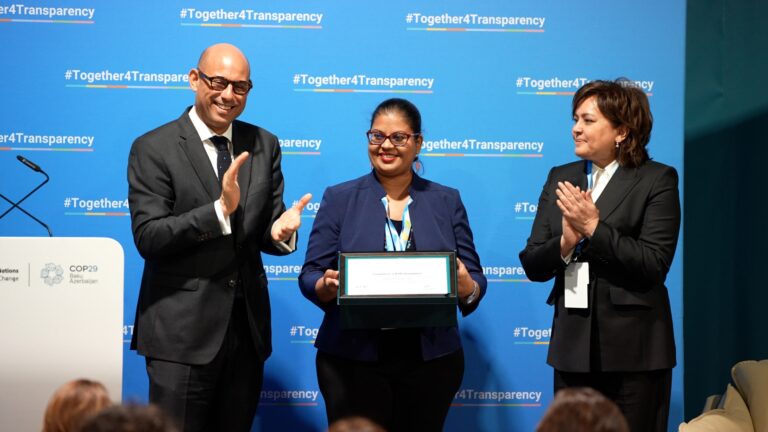Guyana has achieved a notable milestone on the global climate stage by becoming the first developing nation to submit its Biennial Transparency Report (BTR) to the United Nations Framework Convention on Climate Change (UNFCCC). This accomplishment was recognised during the ongoing UN climate summit in Baku, Azerbaijan.
The Biennial Transparency Report is a requirement under the Paris Agreement, aimed at standardising how countries report their greenhouse gas emissions and track progress on their Nationally Determined Contributions (NDCs). These reports also address the financial and technical support received or needed for climate actions, contributing to the Enhanced Transparency Framework (ETF).
The ETF is central to the Paris Agreement, enabling countries to monitor global efforts to limit temperature rise through consistent and transparent data sharing. The information collected feeds into the Global Stocktake, conducted every five years to assess collective progress toward the Agreement’s goals.

Guyana’s Role in Global Transparency Efforts
For Guyana, a forest-rich nation, submitting its BTR ahead of schedule underscores its role in efforts to track emissions and mitigate climate change. The country’s 18 million hectares of tropical forests play a significant role in carbon absorption and combating deforestation.
Pradeepa Bholanath, a climate economist from Guyana’s Ministry of Natural Resources, accepted a certificate from the Enhanced Transparency Framework during the summit. According to Bholanath, the BTR provides detailed data on Guyana’s low deforestation rates, carbon removal efforts, and emissions.
“This dataset lays the groundwork for accessing climate finance from carbon markets,” Bholanath noted, highlighting that funds would be allocated toward the Low Carbon Development Strategy, which integrates national development with support for local and Indigenous communities.
Challenges and Lessons Learned
The process of preparing the BTR was not without challenges. According to Bholanath, the effort required building technical and institutional skills in data collection and emissions reporting. Collaboration with experts, civil society, and academic institutions played a vital role in strengthening the report.
Engaging local stakeholders also improved the document’s quality, ensuring it reflected national efforts across various sectors.
Looking Ahead: Climate Finance and Global Cooperation
Guyana’s progress in climate action depends heavily on financing. Bholanath expressed optimism about the outcomes of this year’s COP, dubbed the “Finance COP,” and the mechanisms under Article 6.4 of the Paris Agreement, designed to facilitate access to climate financing through carbon markets.
Guyana’s experience with the UNFCCC review process provided valuable insights into improving its reporting systems. Bholanath noted that the process has helped establish frameworks to track progress on NDC commitments and set measurable goals for the future.
Bholanath expressed hope that Guyana’s experience could offer lessons for other developing countries preparing their own transparency reports. “Partnership and solidarity are key to achieving our collective climate goals,” she said.
—
This story was originally published by News Room, with the support of Climate Tracker’s COP29 Caribbean Climate Justice Journalism Fellowship.